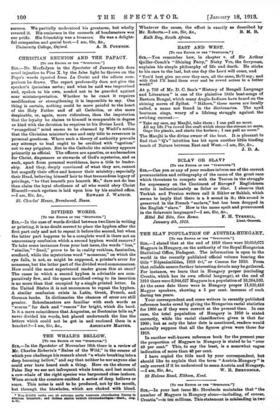EAST AND WEST.
[To THE EDITOR OF THE " SPECTATOR...I
SIR,—You remember how, in chapter v. of Sir Arthur Quiller-Couch's "Shining Ferry," Nicky Vro, the ferryman, explains his simple philosophy of life and death. He sticks to his oars to the last, but one day the Lord will come, and
"You'd best give me over they oars, all the same, He'll say ; and with that I'll hand them over and be rowed across to a better world."
At p. 710 of Mr. D. C. Sen's "History of Bengali Language
and Literature" is one of the plaintive little boat-songs of Eastern Bengal, which many Anglo-Indians have heard on the shining meres of Sylhet. " Hahors," these meres are locally called, a name not found in the dictionaries. The aged boatman sings, weary of a lifelong struggle against the swirling current :—
" Take my oars, my Manjhi, take them ; I can pull no more.
All my life I've rowed the craft which stems the stream no more. Gape the planks, and starts the keelson ; I can pull no more."
The Manjhi is the divine owner of the boat. It is pleasant to find that "Q's" intuition has hit upon another little binding touch of Nature between East and West.—I am, Sir, &c., J. D. A.






































 Previous page
Previous page